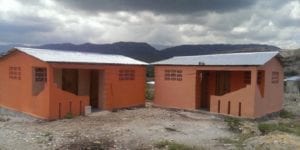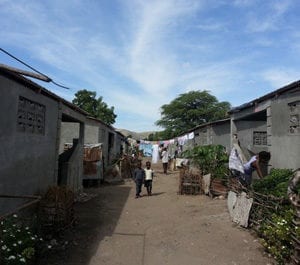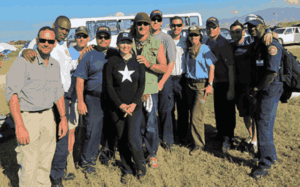 Frank McKinney is a real estate “artist,” bestselling author and “philanthro-capitalist” in Palm Beach County, and as such has been involved with providing housing for the relatively affluent in South Florida for over 25 years. But for more than 14 years now, he has also been building entirely self-sufficient villages in Haiti, the poorest nation in the Western Hemisphere and perhaps the sixth poorest in the world through his Caring House Project Foundation.
Frank McKinney is a real estate “artist,” bestselling author and “philanthro-capitalist” in Palm Beach County, and as such has been involved with providing housing for the relatively affluent in South Florida for over 25 years. But for more than 14 years now, he has also been building entirely self-sufficient villages in Haiti, the poorest nation in the Western Hemisphere and perhaps the sixth poorest in the world through his Caring House Project Foundation.
Frank McKinney, Yanik Silver and Caring House Project Board member Doug Doebler have been organizing unique trips to Haiti. Their upcoming June adventure will give 50 participants the opportunity to undergo a life-changing experience through cultural immersion, seeing the people of Haiti as they live and experiencing the lifestyle that they experience.
Caring House Project Foundation
As part of the 2017 initiative, the Caring House Project Foundation is building their 24th self-sufficient village in their 21st Haitian city in the last 14 years in Haiti, known as the “Yanik Silver Maverick Village” in Guimbi, Haiti, located about 15 miles southwest of Gonaives and two hours north of the capital city of Port-au-Prince. The village will contain 27 concrete and steel homes to house a total of 216 children and their families, one solar powered large concrete and steel multi-purpose building containing a school/church/community center, 16 concrete and steel latrines, water filters, solar lighting, and hundreds of goats and chickens. All elements of the village will be provided to the residents at no cost to them.
As their stated mission, “The Caring House Project Foundation shall create projects based upon self-sufficiency by providing housing, food, water, medical support and opportunity for the desperately poor and homeless from around the world, particularly in the Caribbean, South America, Indonesia, Africa and here in the USA.”
We asked Frank McKinney about his involvement with housing projects in Haiti, and to share his philosophy and the platform from which they offer these services.
Good News: Would you say that your Haiti projects are faith-based or secular?
Frank: We like to believe that our trips and philanthropic efforts are inclusionary, as our trips have been open to Christians, Jews and Muslims, and even people of no faith at all. We believe that it is more important to fulfill the mandates of the Scriptures than to do it in a particular Name.
Good News: Then your organization is primarily secular in nature and not based on a particular faith?
Frank: We see the Jesus of the Bible as a very down-to-earth, relational and loving person. If he appeared today working with us in Haiti, I believe he would be wearing jeans and a T-shirt, wearing sneakers and carrying an iPhone. It is more important for us to feed the poor, clothe the naked and to provide sturdy housing and clean water for an impoverished people than to give them dogma and doctrine. We try to live out the message of Luke 12:48, “For everyone to whom much is given, from him much will be required.” (New King James Version)
Good News: Do you work with local pastors in Haiti?
Frank: We normally work closely with the local Catholic priest in the village, as he is the best contact and networking partner, since he knows all of the stakeholders. I am personally a deeply religious person, of the Catholic faith. As you know, Haiti is 90 percent Catholic and 100 percent voodoo.
Good News: How long do your immersionary trips last? And what is the cost for the participant?
Frank: The trips are normally three days and two nights in Haiti. We find that most people that can afford to go cannot typically get a full week off as they are working. The cost per person is $4,990, of which approximately $990 pays for airfare, hotel, ground transportation, food, drink, security, translators, etc. The other $4000 goes to build a brand new concrete home for a Haitian family.
Good News: If you are only on the ground in Haiti for three days and two nights, then the 50 or 60 people on the trip do not really have time to do any construction or hands-on involvement with the projects.
Frank: No, all of the construction is done with local labor and materials. If the donors on the trip did the construction work, they would be taking work and money from the ones who need it the most. The trips are basically fund-raising efforts for our sustainable village projects.
 “Each of us is fortunate to be blessed with the ability to succeed at some level. This success is not for our sole benefit however, but so we might apply the result of our success to assist those less fortunate,” said McKinney. “Compassion Without Action is a Waste of Emotion.”
“Each of us is fortunate to be blessed with the ability to succeed at some level. This success is not for our sole benefit however, but so we might apply the result of our success to assist those less fortunate,” said McKinney. “Compassion Without Action is a Waste of Emotion.”
In the last 14 years Frank and the Caring House Project Foundation have accomplished the following:
- Built 24 self-sufficient villages in Haiti since 2003 – housing 10,616 individuals by the end of 2017
- Built schools, community centers, medical buildings and orphanages in Haiti that support thousands
- Built a fishing cooperative in a rural village in Haiti
- Taken supplies directly into the hardest hit regions after Hurricane Katrina, just days after the disaster
- Mobilized a team of first responders and flew with them to Haiti 48 hours after the January 2010 earthquake, directly saving the lives of 4 Haitians buried in the rubble
- Provided over 1/2 million meals & temporary shelter for 4,000 people in Haiti after the 2016 hurricanes
- Quickly responded and supplied water filter systems to over 1000’s affected by the Cholera outbreak in Haiti
For more information go to www.chpf.org; www.frank-mckinney.com; or www.haiti-trip.com.
Robert Woods has worked as an engineer at AECOM Technical Services and HBC Engineering, and is a published Christian author. He served as a full-time missionary in Les Cayes, Haiti for a year. He and his wife Marie, a Haitian national from Les Cayes, have served at CCFL. He can be reached at [email protected].


Comments